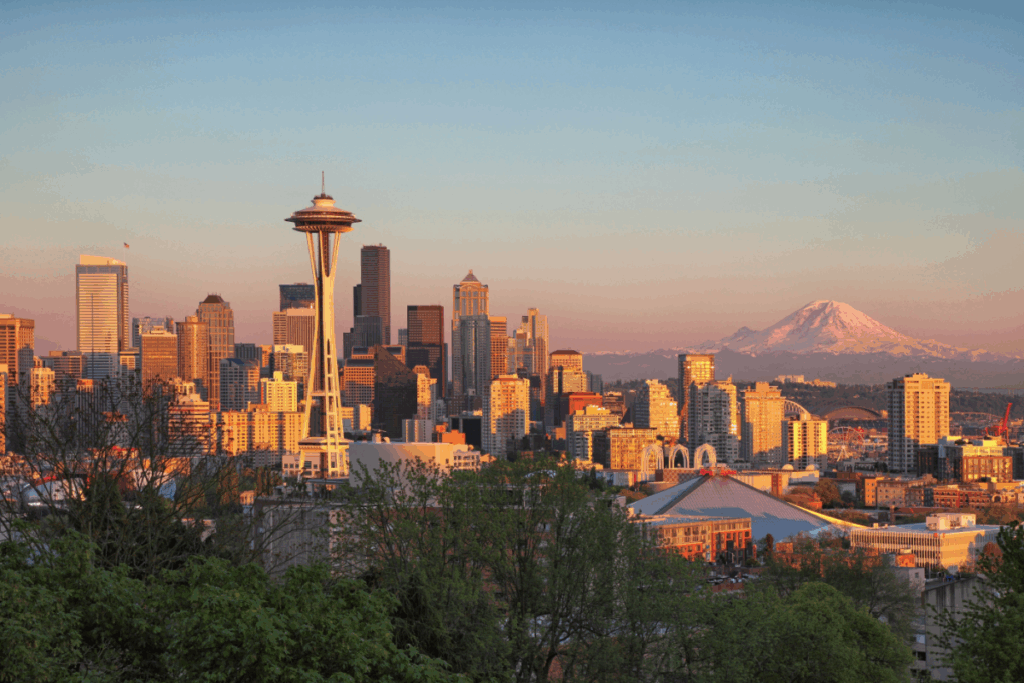Seattle’s mayoral race is heating up as ballots go out ahead of the November 4 election, with incumbent Bruce Harrell battling to retain his seat against progressive challenger Katie Wilson. Wilson, a community organizer and general secretary of the Transit Riders Union, finished nearly ten points ahead of Harrell in the August primary — signaling a potential shift in Seattle’s political direction.
At stake is whether the city continues Harrell’s focus on public safety and downtown recovery or embraces Wilson’s call for expanded social housing and deeper public investment. The contest has quickly become one of Seattle’s most ideologically divided mayoral races in years.
Social Housing: A Defining Divide
One of the sharpest disagreements centers on Seattle’s social housing program, a taxpayer-funded initiative aimed at building mixed-income public housing.
Wilson entered the race, in part, because Harrell opposed a February ballot measure to raise business taxes to fund the effort. Instead, Harrell supported a competing proposal that would have kept funding flat and restricted eligibility for new tenants — a plan voters ultimately rejected.
“The mayor has failed to seize the opportunity voters gave him to address our housing crisis,” Wilson said during an October 8 forum at Seattle University. “Seattle can’t solve homelessness without real investment in affordable homes.”
Harrell, for his part, maintains that Wilson’s housing promises are fiscally unrealistic, arguing that her plan to create 4,000 new emergency shelter units would strain the city’s budget. “We can’t build solutions on wishful math,” his campaign said.
Homelessness: Performance vs. Promises
The homelessness crisis remains a key test of Harrell’s leadership. Since taking office, he’s emphasized clearing encampments and connecting residents with shelter options. “I will clean streets if I have to, to make sure they are safe,” Harrell said during a FOX 13 debate last month.
Wilson has sharply criticized this approach, accusing the mayor of “spending money moving encampments around” rather than solving the underlying problem. She argues that Harrell failed to meet his 2021 campaign promise to create 2,000 new permanent supportive housing units or shelters in his first year.
“We have more people sleeping outside today than four years ago,” Wilson said. She has proposed converting currently vacant affordable housing units into temporary housing — an idea Harrell’s team called impractical, saying many of those units are “ill-equipped” for immediate use.
Policing and Surveillance: Evolving Policies, Old Tensions
Public safety has been another flashpoint. Harrell aims to rebuild Seattle’s police force to 1,500 officers, up from fewer than 1,000 earlier this year. “My opponent has no background in public safety, except arguing to defund it,” Harrell said during a debate hosted by The Seattle Times and KING 5.
Wilson acknowledged that her stance has evolved since supporting 2020 efforts to cut the police budget. “We got some things wrong,” she said. “You can’t just scale down police based on calls — we need both reform and alternatives.”
The two also clashed over surveillance technology. Harrell recently supported expanding CCTV and traffic camera access for police, calling it a “best practice” that speeds emergency response. Wilson opposed the expansion, warning that federal agencies under a Trump administration could misuse such data to target undocumented residents.
Taxes and Business: Different Approaches to Equity
Both candidates support Harrell’s existing plan to lower taxes on small businesses while increasing them for major corporations. However, Wilson diverges in proposing a citywide capital gains tax to help close Seattle’s looming budget gap.
Harrell’s campaign has pushed back, arguing the tax would be difficult to enforce and yield limited revenue. Still, the mayor recently indicated he is “open to discussion” on broader tax reforms if the city’s financial outlook worsens.
A Contest About Identity and Direction
The Harrell-Wilson race is about more than budgets and policy details — it’s a referendum on Seattle’s political identity. Harrell represents continuity and pragmatic governance; Wilson embodies the city’s restless progressive base, eager for structural change.
With mail-in ballots already circulating, both campaigns are making their final appeals. For Seattle voters, the decision may come down to a single question: Should the city double down on recovery or take a leap toward reinvention?


